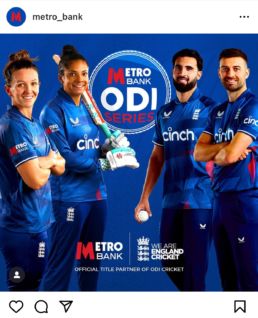A powerful shift is occurring in the ever-evolving sports landscape as an increasing number of brands are waking up to the untapped potential of partnerships with women’s sport.
The momentum behind women’s sport has been steadily building in recent years, and monumental victories, such as Emma Raducanu’s US Open title and the Lionesses’ triumph at the 2022 Euros, have propelled women’s sport even further into the UK spotlight. Alongside this momentum, brands have become even more aware of the significance and benefit of investing in women’s sport. They no longer ask ‘if’ but ‘when’ they should get involved.
I recently attended an excellent webinar hosted by the Women’s Sport Trust entitled ‘The Value of Women’s Sport – what’s working in women’s sport sponsorship’. It took a deep dive into the current state of this type of sponsorship in the UK, highlighting how brands can connect better with fans, the obstacles to investment, and how barriers can be overcome.
Here are my 6 key takeaways.
1. commercial/creative rigour is required
There’s been a persistent gap in innovative activation in women’s sport advertising in the UK which in turn results in a scarcity of memorable campaigns. Although I questioned this notion initially, I soon realised that I could not bring to mind a single women’s sport-focused campaign. So, there’s a huge creative opportunity out there, with lots of space to create smarter deals with unique, memorable and impactful campaigns.
2. a need for culture building
It’s vital to build a culture that makes sponsorships more recognisable.
There are 3 main ways to do this:
1. provide cross-cultural opportunities, e.g. delve into the interests/passions of female athletes beyond their respective sports to add depth/resonance to sponsorship initiatives
2. celebrate the differences/ distinctiveness of women’s sport – the most effective sponsors look through a subtly different lens rather than a ‘one size fits all’ approach
3. move from purpose to performance: purpose (i.e. equality, diversity) has previously been at the forefront of sponsorships, initiating change and addressing systemic issues; but performance is now fully in the mix and sponsors need to elevate the narrative by celebrating the abilities/skillsets/achievements of female athletes
3. awareness can be equivalent to that of men’s sport sponsorship
Men’s and women’s sport sponsorships exhibit very different characteristics, the former tending to be associated with success and achievement and the latter often leaning towards promoting diversity. Despite this, in a consumer study by the Women’s Sport Trust, it was found that the highest-profile women’s sport properties generated awareness levels equivalent to those of major men’s sport properties. The sample of respondents were asked if they were aware of a range of brands participating in sponsoring different men’s and women’s sports. The result? 24.5 million people in the UK are aware of at least one women’s sport sponsorship, meaning they can generate significant awareness for brands.

4. high levels of affinity/consideration
The consumer study also reported that 48% of those surveyed had an affinity with any type of women’s sponsorship and 20% were more likely to buy from a business that sponsored women’s sport. These statistics underscore the growing significance of such sponsorships.
5. positioning can be more than about equality
The study further showed that a significant 60% believe that sponsors should invest in both women’s and men’s sport, with an equally notable 56% in favour of equal investment. Although equality clearly holds significance for consumers, it doesn’t mean that brands should focus solely on championing it in their campaigns. Growing participation, driving awareness, building excitement are seen as important, too. Brands need to be braver – and look further afield – in their activation of women’s sport sponsorship. This in turn will surely elicit an increase in positive reactions from consumers/fans alike.

6. the UK public wants to see brand investment
Investment, investment, investment. More consumers – across all levels of sport – appear more likely to do business with a sponsor of a women’s sport than a men’s one. When presented with the statement ‘I think more favourably of companies/brands that support women’s sport through their sponsorship’, 42% of 18–24-year-olds agreed. However, only 24% agreed when the same question was asked about men’s sport. It’s actually more valuable, therefore, for brands to prioritise their involvement in women’s sport! And to note that two out of five adults in the UK would also like to see more brands engage specifically in sponsorship of community/grassroots women’s sports.
She Moves The Game is Redtorch’s commitment to play a part in breaking down the barriers, creating a level playing field, and celebrating the remarkable achievements of women in sport.
Follow Redtorch on LinkedIn to stay on top of all the latest developments/stories surrounding She Moves The Game. Contact Jess Reus on jess.reus@redtorch.sport or +44 (0) 7719 021 663 for all enquiries.





